Από τη Ρώμη στην Αστυπάλαια: μία αθωωτική απόφαση του Αυγούστου. Ι. Knidos 34.
Ενότητα:
Μελέτες Ιστορίας Δικαίου
Τίτλος μελέτης
Από τη Ρώμη στην Αστυπάλαια: μία αθωωτική απόφαση του Αυγούστου. Ι. Knidos 34.
Γλώσσα: Ελληνικά, Νέα (1453-)
Τίτλος εντύπου
Επετηρίς του Κέντρου Ερεύνης της Ιστορίας του Ελληνικού Δικαίου
Γλώσσα: Ελληνικά, Νέα (1453-)
Αριθμός τόμου
42
Είδος εντύπου
Επετηρίδα
Έτος έκδοσης
2010
Συγγραφέας/ Εκδότης
Καραμπάτσου , Ελένη Δ.
Αριθμός σελίδων
95-109
Γλώσσα
Αγγλικά
Περίληψη
Eleni D. Karabatsou: From Rome to Astypalaea: an acquittal in an epistula of Augustus. I. Knidos 34 This inscription, engraved on a marble stele found in the castle of Astypalaea and dated in the second half of the year 6 B.C., contains a letter of Augustus to the Cnidians, in the form of an epistula principis. Augustus informs the magistrates, the parliament and the people of Knidos of the steps he has taken and the decision he has rendered in an alleged case of murder. The case has as follows: Philinos, son of Chrysippos, for three nights in succession attacked the house of Euboulos, son of Anaxandridas and his wife Tryphera with outrageous insolence and a kind of siege. On the third night Philinos brought along his brother Euboulos. The masters, δεσπόται, of the house - Tryphera being explicitly included between them in lines 17 to 18 — were unable to obtain safety in their own house, either by negotiating with Philinos or by fighting off his attacks. That is why they ordered one of the slaves to drive off the attackers by emptying the contents of a chamber pot over them. The slave - willingly or unwillingly - dropped the pot which struck and killed Euboulos, Philinos' brother. Euboulos and Tryphera, being accused for murder and fearing to allow the Cnidian court to examine their slaves, fled to Rome aiming to request a decision by the emperor. The Cnidians themselves sent two envoys to Rome who appeared before the emperor and gave him the decree with which they accused Euboulos, now dead and Tryphera for the crime. Tryphera was definitely present at Rome during the trial, and. possibly, during the procedure itself, as is clearly stated by the present participle παρούσης in line 9. Augustus orders Asinius Gallus, proconsul of Asia in years 6/5 B.C., to investigate the case through torture of the slaves involved in the affair. The latter acts as the emperor's friend considering the fact that his authority as proconsul Asiae did not extend over a civitas libera, such as Knidos. Augustus sends the records of this investigation to the Cnidians as well. He, then, pronounces his final judgment on the case, acquitting both the accused and reproaching the Cnidians of showing excessive cruelty and prejudice towards those whose only fault was being too unlucky in their defense. He, also, accuses them of having turned their hatred for the crime to the wrong direction, bearing no indignation towards those who deserved every punishment, for not only did they attack another’s house thrice at night with outrageous insolence and violence, «μεθ’ ὓβρεως και βίας» of line 33, but also endangered their own public security. Augustus finally instructs the Cnidians to make sure that the records in their public archives agree with his decision on the case. Although no concurrent epigraphic parallels are known for penal cases, this is most probably not a case of appellatio. Augustus pronounces a judgment in the first degree, based on his tribunicia potestas, in virtue of which he extends auxillium to - at least - the privileged inhabitants of the empire, as in the case of citizens of civitates liberae. The latter had the right to appeal directly to the emperor and this is what Euboulos and Tryphera did.On the other hand, Knidos, a free city, did not feel able to condemn in a capital case, when the defendants did not accept trial. Furthermore, because of his personal interest in an orderly society. Augustus seems to regard this case not as a mere incident between citizens, but as a potential source of public disorder. Therefore, he literally accuses the Cnidians of showing contempt of one of the main imperial values of his time, securitas publica, «την κοινήν απάντων ὑμῶν ἀσφάλειαν» of line 34. In spite of the emperor’s judgment in her favour and her obviously prominent social position. Tryphera must have feared to return to Knidos because of the hostility of her fellow citizens. She went to live on Astypalaea, a small island opposite the Carian coast, probably her city of origin, which had been civitas libera et foederata since 105 B.C. The epistula principis, published either by her or by Asinius Gallus as a warning to unruly elements at Astypalaea, continues to proclaim her innocence until today.
Θεματική ενότητα
Δίκαιο της ελληνορωμαϊκής αρχαιότητας-Δημόσιο δίκαιο-Πολιτειακοί θεσμοί
Δίκαιο της ελληνορωμαϊκής αρχαιότητας-Ποινικό Δίκαιο-Δικονομικό δίκαιο
Εκδόσεις πηγών του δικαίου
Creative Commons
Αναφορά Δημιουργού - Μη Εμπορική Χρήση - Παρόμοια Διανομή 4.0 Διεθνές - CC BY-NC-SA

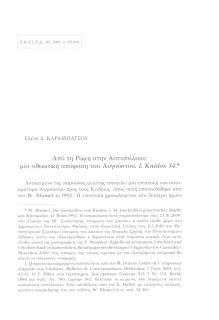
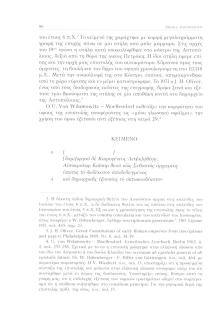
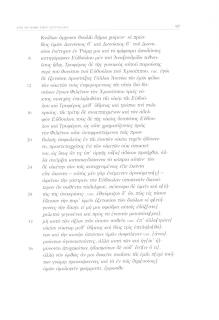
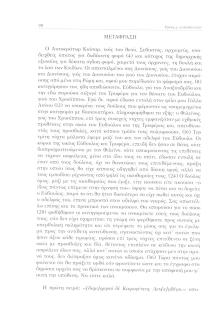
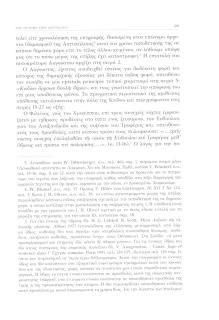
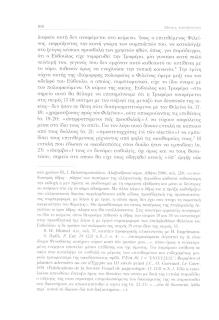
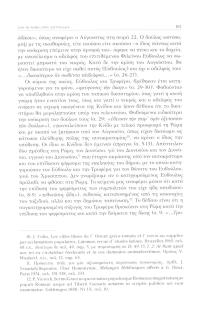
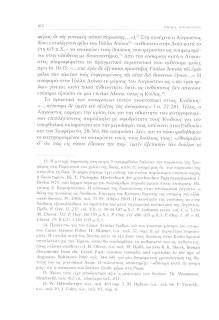
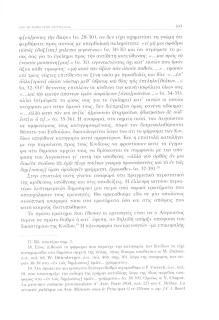
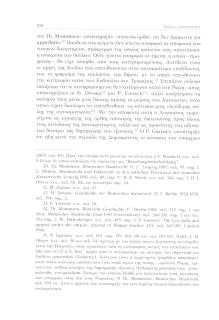
 Ξεφύλλισμα pdf
Ξεφύλλισμα pdf